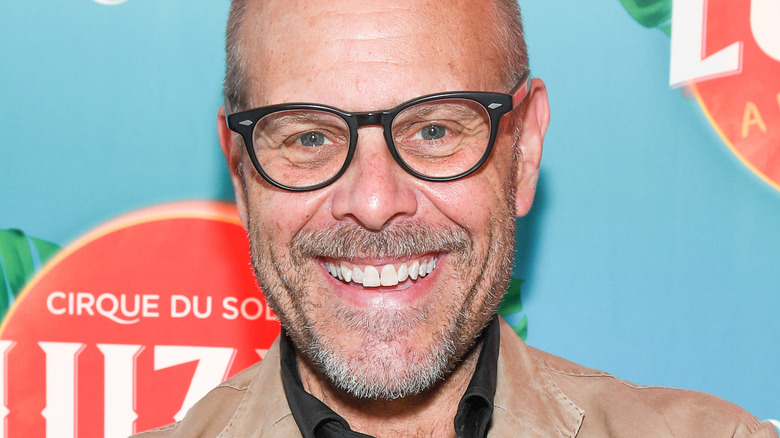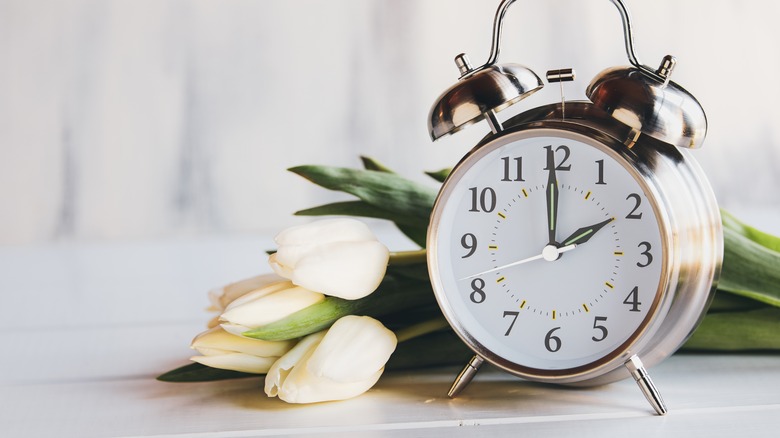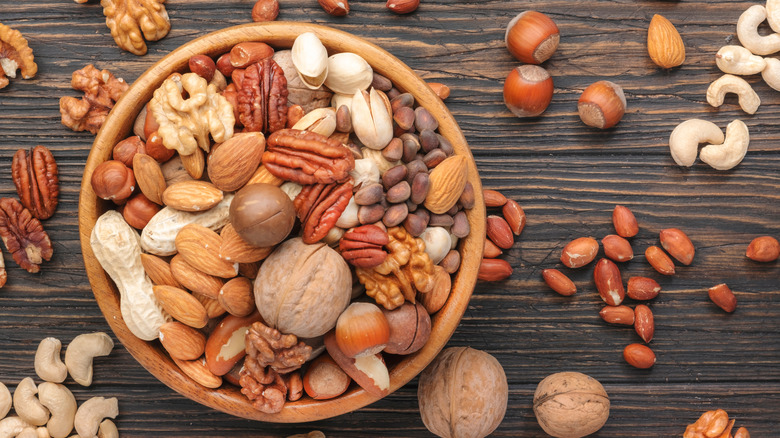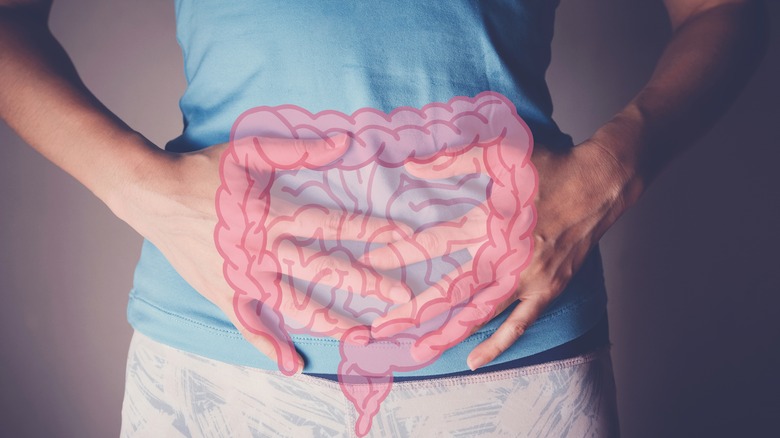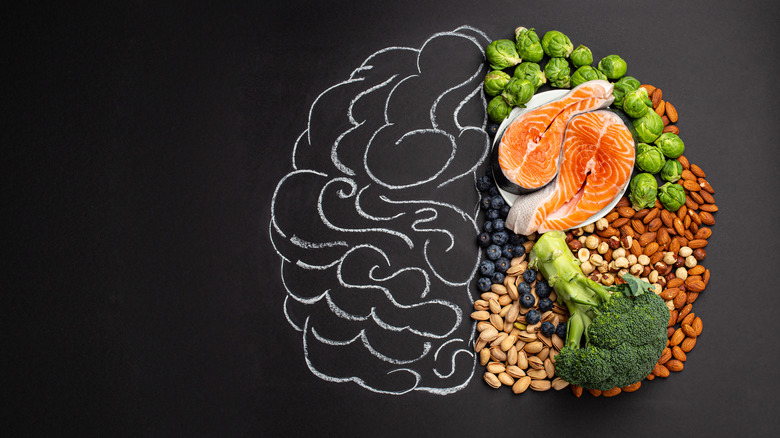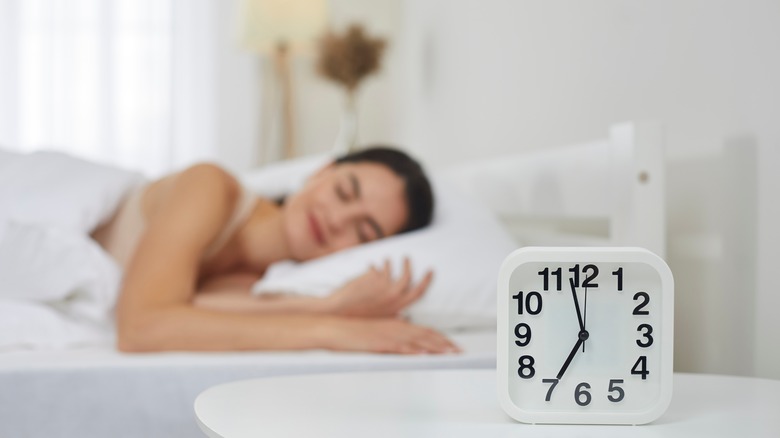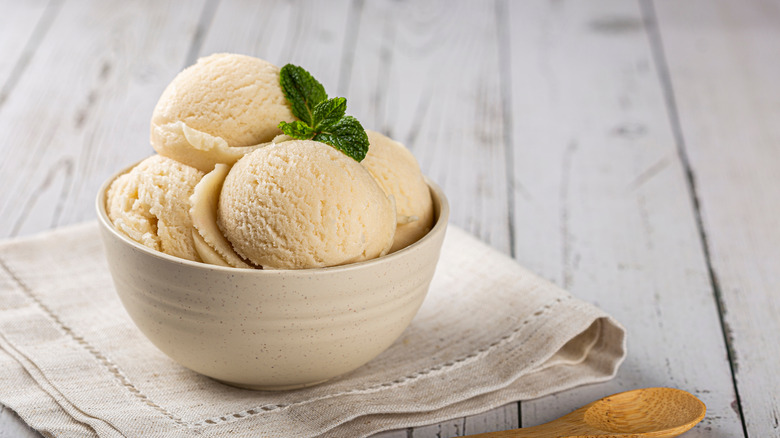Alton Brown Combats Daylight Saving Time With Clever Sleep And Nutrition Tips - Exclusive Interview
Alton Brown is a science guy: Food science with some sprinkled-in comedy is his feat on television, as was displayed on Food Network for nearly 20 years. Health Digest experienced his skills firsthand through a unique cooking class (showcasing his overnight oats recipe) and an intimate breakfast. After consuming a delicious morning meal featuring Brown's recipes with brain supplement brand Neuriva, we sat down with the "Good Eats" star for an exclusive interview — and yes, it's all about science.
Brown partnered up with Neuriva last fall around the time he spoke with us about his milestone of turning 60. Now, the food mogul is here to shine a light on brain-enriching foods, practicing healthy sleeping habits, and highlighting the importance of the gut (it is the second brain of the body, after all!). As daylight saving time and Sleep Awareness Week kicked off, Brown disclosed his top tips for combating the time change successfully, both physically and mentally. The food personality advised readers to "be in a constant state of learning," especially when it comes to our personal wellness, so keep that in mind while you read on.
Turn the clock back early
I wanted to start off by talking about daylight saving time. It's Sleep Awareness Week as well. What are you doing to combat the fatigue of daylight saving time?
I wouldn't say that it's fatigue as much as disorientation. It takes me a good week to get past it, and one of the things that I do — it's funny; I have a harder time with the jump forward than the fall back, but then, everybody does — is I reset my clock long before I go to bed that night. It's a thing. At 6 o'clock the night before, I go ahead and change my clock, so I'm looking at it, getting used to it, and then change my routine to match that time. The time change at 2 in the morning doesn't do me any good — I'm asleep, and then I get up in the morning and it's weird. So I gave myself [extra time to adjust].
I got that trick from ... It's something I do on airliners whenever I travel to other times, and the second I get on the plane, I reset my watch because I'm one of those people that's always looking. I give my brain as much of a jump on things as I possibly can. Also, the night before a time change, I don't drink alcohol. I don't know why it seems to help, but it does.
Well, when you drink alcohol right before you go to sleep, you're not going to sleep well anyway.
Is that true?
Sometimes. For me, that's true. It depends on the abundance.
Oh my God, it does. It very much does.
Brain health is about the food we eat
Do you have any general tips for staying healthy and nutrition-focused during this time change?
Regular exercise and an absolute bedtime, and trying to load up your diet on things that are good brain fuels ... Whenever we go through a state of disorientation or the change of a routine, you've got to put a stake in the ground to help your brain and your body keep reorganized and reused to things. I did take my Relax & Sleep, but right before I went to bed that night, I took it every night. [That] also ups my quality of sleep, which helps because quality of sleep in relation to amount of sleep changes during daylight savings.
It's important to do everything you can to get the best quality, even if you're not going to get as much as you would ordinarily. Although I can do caffeine at night, it's a good idea to stay away from it. The other thing we do is whenever the time changes, we sleep with all the curtains open so that natural cues are easier to get.
That's smart. Today I closed my curtains, and it was hard for me to get up.
Very much so. Of course, there wasn't much more light on the outside [today] than there probably was on the inside.
You mentioned some ingredients or foods that would help your eating habits, brain health, et cetera. Are there any certain ingredients you can mention that someone can include in their diet, even if they're already relatively healthy?
Absolutely ... Americans, generally, need to be eating more nuts. We need to be eating more berries. We need to be eating more leafy greens. It's the stuff that our grandparents taught us, and it turns out to be true for our brains. We're just now coming into the research to help us understand how that works, because the brain's a slippery weasel under the coffee table. It's a very different organ. We're just starting to figure it out, and a lot of these ingredients are things that are not easy to get in food.
Your gut is the second brain
Alton Brown [continued]: I talk a lot about the power of the coffee cherry extract, which is really tough to get in your food, which is why I get it from Neuriva Plus — or one of the things in Relax & Sleep, L-Theanine, which is readily available in tea, but so is caffeine, and they can't be separated from each other in tea. But it's a great ingredient for helping to get your brain into an alpha wave state, which we don't have to get into, but [it's] basically an uncluttered mind, a meditative mind, which is pretty great. More oily fish — I tell people that all the time. More oily fish; more dark, leafy greens. It's the same story we've heard for so long — staying away from processed foods above all.
I've been doing that recently and I feel so much better.
You can actually, in my experience, up your caloric intake, but if you get rid of processed foods, you could up your calories and still lose weight and be healthier, which is crazy when you think about it.
I actually gave it up a few weeks ago, and I've already lost some weight without intending it.
It just happened.
But mentally, I feel so much clearer because sometimes processed food can make you not feel as great.
No, and there is a direct relationship between what's going on in our guts and what's going on in our brains, which seems very like a strange concept, but it's 100% true.
I've heard that your gut is the second brain.
It is. That's been written about — you're absolutely right. There are a lot of physicians that definitely hold that your microbiome is the second brain, which means I can finally think with my stomach.
Brain health comes down to learning
We're talking about brain health — can you actually define what brain self-care is for you and what it means to you?
Part of it is understanding you can't separate learning from, say, taking a supplement. If you want to responsibly take supplements, you learn about them, you talk to your doctor, you discover things. I did a lot of brain research and understanding neuroplasticity and trying to understand something about the way signals move around. What are the actual mechanisms? What's the wiring like in there?
Being aware helps in figuring that out, in figuring that you want to be able to think, you want to be ... In Neuriva, we talk about the six hallmarks, the benchmarks of brain health — it's accuracy, concentration, focus, learning, memory, and reasoning. I count those off on my fingers because I actually think a lot about each one of those things and what we need in order to have those. I've created benchmarks for myself where I examine, once a week, how's my brain doing? How do I do this? Is my quality of work here? Did I do this as fast as I should? Am I having a hard time focusing on things?
I have Post-it notes around my house where I've written down those six benchmarks so I can use them as a checkoff for my own performance. You get to be my age, nobody's going to tell me I suck at something — they just aren't — so it's good to have a self-check for, "Am I sucking, or am I doing better on this?" I appreciate this product for those six things that they say on the box.
In addition to the supplements, are there any tactics that you think people can incorporate for brain health that they may not have thought about or know to do?
Learn. Be in a constant state of learning. When I look at the most fruitful times in my life, even if it's just a week here or a week there, I am always in a state of learning. There's been a lot written, especially in regard to neuroplasticity, about how you can rewire your brain. I do a couple of things: One, I try to eat right; I try to exercise; I get sleep. I do take Neuriva — I take Neuriva Plus every morning [and] Neuriva Relax & Sleep every night, so I'm giving myself the ingredients that I need.
The rest is up to me, and my brain works better when I am always learning, and I can be learning anything. Learn how to play a musical instrument, learn another language, even if you're not very good at it. It's like giving the brain a job to do.
I think about my brain as a dog. My dog's happy when it's fetching. It wants to go do something. It's very simple to fall into a negative routine — if you do the same thing with your brain every day, your brain gets bored and it wanders away, and it goes to chew up your shoes and it pees in the kitchen. Giving your brain a different job that is a progressive learning job is super important.
Form a habit with your sleep
I remember that the last time we talked you were incorporating paddleboarding and screens off for an hour [before bed].
Yep, we paddleboard a lot. I've spent most of my life dreading exercise because, "Oh God, I got to go do this." My wife was a competitive paddleboarder, and she's like, "I'm going to teach you how to do this," because I'd always been afraid of it a little bit. I always thought, "I'm going to knock my teeth out." That was my big thing. "I'm going to knock my teeth out." She actually taught me, and it became the base of physical fitness for me.
It's fun. On top of that, when you get way out there, you do have to come back ... and sometimes [coming] back's not as easy, either because of currents or wind. So I do it. When we're in New York, we don't do it very often because of the East River's cruel mistress ... We're in Georgia and Alabama part of the year, so we always make sure we're around water if we can.
With you traveling a lot, how do you prioritize sleep when you have a busy schedule?
Habits — by having an absolute bedtime. I actually write my bedtime in my schedule. That's the end. I set an alarm on my phone to tell me when I'm an hour from bedtime. I can't be like, "La, la, la, I'm ignoring that. I'll do this and I'm going to watch this movie, and I'm going to have a cocktail bottle." If that thing goes off, I start my shutdown procedure. It's like a computer. I'm going to turn off this program, I'm going to shut this down, and the lights are going to come down. I make sure we make sure the dogs have been walked, whatever has to be done is done, so that the rest of the time can be that power down. We don't just get in bed and expect miracles.
You're creating boundaries for yourself as well. That's hard.
Boundaries ... [are] really good because when parts of your body, especially your brain, know what to expect from you on a day-to-day basis, they behave a certain way.
Right. And every person varies.
Completely.
Brown has his sleep schedule down to a science
When you set that time to go to sleep, how many hours do you need to feel energized for the day?
I have found that peak performance for me comes with seven hours of sleep. I can cheat it down to six, but seven, if I set myself ... Here's how I know that this is what works. If I set up my shutdown time, and I've taken my Relax & Sleep, which I do religiously an hour before I go to bed, I will naturally wake up in exactly seven hours. I never need a 7 o'clock [alarm], ever.
Really? I'm jealous of that.
I will wake up. See, the thing is that I trained my brain to do one thing, and then it tells me what it needed. It's decided "Seven hours, and you wake up," and I usually wake up literally within 10 to 15 minutes of exactly seven hours — unless something goes on with the dog, because our dogs end up in the bed with us, and if they hear something and bark, that screws things up. But ordinarily, that's how I know what I need, and it doesn't change when I travel at all.
If I'm by myself and it stays, that's how I know it's seven hours. I know that's how it's key for me, but I didn't know that until I set up my power-downage routine at night.
That's impressive, though — you could keep that through all of your schedule and stuff.
Sometimes, I fall off the horse like anybody else does, and sometimes you've got to catch the red eye — that's the way it is, and that messes things up. But I find that it's easier to get back on course, like with jet lag or something like a time change, if you're giving yourself all the benefits of a routine, good diet, the right supplements, and exercising.
Brown doesn't like the word 'diet'
In my experience, lack of sleep can cause overeating and can cause you to crave more carbs instead of maybe prioritizing the healthy foods that you would normally reach for.
Oh, no. I would normally reach for bad things. Let's be clear — my natural default is a potato chip pack or French fries or something else. I want to say that.
What would your tips be for tackling this issue? Ice cream is my thing.
Mine is also ice cream, as far as nighttime. I can eat a pint of ice cream without blinking. Often, we'll put the empty container back in the freezer so my wife won't know I did it ...
There's a couple of things. One, I try to make sure that I get all the good stuff first, which is why I try to make sure my breakfast is nutrient-loaded. That way, I've at least done the right thing. Now all I have to do is not mess up for the rest of the day. Since you and I have the same problem, I'll tell you — I will pre-measure my ice cream portions and put them in containers, so it's like, "I can have this entire container of ice cream because I've already measured it." I already know what's in it. That keeps me out of the carton.
That's smart.
I have to do things like that because I will self-shame. Even if I'm by myself in the kitchen, if I've eaten all this, I will be too embarrassed to open it and get more out. But the first thing is to get good nutrition and to say there are going to be some things you've never eaten, ever under any circumstances. I will not touch food with the word "diet" on it. I won't do it. It's a decision that I've made for myself, and it doesn't work for everybody.
Everyone thinks Diet Coke or something like that is good ...
I don't like the word "diet." Our brain ... Well, the other problem with that is — we won't get into this now — but your brain becomes addicted to sweetness at levels that are not natural for human beings. It's certainly not good for brain function.
To learn more about Neuriva supplements, check out the brand's website. Keep up with Alton Brown's latest culinary projects on his Instagram page.
This interview has been edited for clarity.

